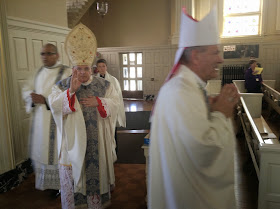http://thedivinemercy.org/library/faq/commonanswers.php?newsID=63 for more see link
Can I attend the Vigil Mass on Saturday and receive the graces of Divine Mercy Sunday?
Yes, the Vigil Mass fulfills the Sunday obligation of the Feast of Divine Mercy, so the extraordinary graces are available when you receive Holy Communion in a state of grace at the Saturday Vigil Mass.
Yes, the Vigil Mass fulfills the Sunday obligation of the Feast of Divine Mercy, so the extraordinary graces are available when you receive Holy Communion in a state of grace at the Saturday Vigil Mass.
A. Our Lord's promise to grant complete forgiveness of sins and punishment on the Feast of Mercy is given to those who accept His invitation to come to the Fountain of Life. These graces are for ourselves.
I want to grant a complete pardon to the souls that will go to Confession and receive Holy Communion on the Feast of My mercy (Diary 1109).
Whoever approaches the Fount of Life on this day will be granted complete remission of sins and punishment (Diary 300).
The soul that will go to Confession and receive Holy Communion shall obtain complete forgiveness of sins and punishment (Diary 699).
However, given the extraordinary graces that the person receives from Holy Communion on Mercy Sunday namely, the complete renewal of baptismal grace the time after that Communion is an excellent time for the communicant to intercede for loved ones on earth, and to begin to undertake indulgenced works, as established by the Church, for the sake of the souls in purgatory.
In fact, Pope John Paul II granted a plenary indulgence for special devotions to The Divine Mercy on Divine Mercy Sunday, and these indulgences can be obtained for the suffering souls in purgatory.
Q. Some people in our parish insist that we must go to Confession on Mercy Sunday because that's what St. Faustina wrote in her Diary. They want to do what she said, not some interpretation of it. Do I need to attend Confession on Divine Mercy Sunday?
A.Cardinal Macharski, the Archbishop of St. Faustina's own archdiocese of Krakow, Poland, wrote a pastoral letter to all his priests on January 30, 1985, on how to prepare for and celebrate Divine Mercy Sunday. In it he said that all of Lent should be a preparation to celebrate Easter and Divine Mercy Sunday worthily. The Sacrament of Reconciliation should be received sometime in Lent, not put off until the last minute (Holy Week). We go to Confession with the intention of repentance and to amend our lives, and we should live in such a way as to be worthy to receive Holy Eucharist. If we have any venial sins, a good Act of Contrition will take away those sins.
St. Faustina did not go to Confession on Divine Mercy Sunday. For example, we find in Diary entry 1072 that she went on the day before in preparation for Divine Mercy Sunday. It was not the custom at that time to make Confessions on Sundays. Our Lord would not have asked her, or any of us, to do what is impossible. It would be impossible for everyone to go to Confession on Mercy Sunday.
NO Purgatory! This indulgence is like a second baptism.
Q. What extraordinary graces are available on Divine Mercy Sunday?
A. Our Lord revealed to St. Faustina His desire to literally flood us with His graces on that day. He told her: On that day the very depths of My tender mercy are open. The soul that will go to Confession [beforehand] and receive Holy Communion [on that day] shall obtain complete forgiveness of sins and punishment (Diary 699).
The theologian who examined St. Faustina's writings for the Holy See, Rev. Ignacy Rozycki, explained that this is the promise of a complete renewal of baptismal grace, and in that sense like a "second Baptism" (in much the same way that St. Catherine of Siena called sacramental Confession, undertaken out of true love of God, an "ongoing Baptism") (The Dialogue, no. 75).
The extraordinary graces promised to the faithful by our Lord Himself through St. Faustina should not be confused with the plenary indulgence granted by Pope John Paul II for the devout observance of the Second Sunday of Easter (Divine Mercy Sunday). The Decree of the Holy See offers:
"A plenary indulgence, granted under the usual conditions (sacramental confession, Eucharistic communion and prayer for the intentions of Supreme Pontiff) to the faithful who, on the Second Sunday of Easter or Divine Mercy Sunday, in any church or chapel, in a spirit that is completely detached from the affection for a sin, even a venial sin, take part in the prayers and devotions held in honour of Divine Mercy, or who, in the presence of the Blessed Sacrament exposed or reserved in the tabernacle, recite the Our Father and the Creed, adding a devout prayer to the merciful Lord Jesus (e.g. Merciful Jesus, I trust in You!)..."
Jesus, I trust in You!
Suggested Reading:
Vatican Grants Plenary Indulgence for Divine Mercy Sunday
Download free PDF of Understanding Divine Mercy Sunday

















